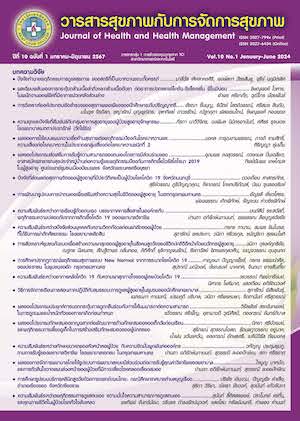Factors Predicting on Health Care Behaviors in Gestational Diabetes Mellitus Women
Keywords:
factors predicting, health care behaviors, gestational diabetes mellitus womenAbstract
This study was predictive correlational research. The purpose of this study was to study relationships and predictors of health care behaviors in gestational diabetes mellitus women. The samples were 100 of gestational diabetes mellitus type A1, who were selected by purposive sampling. The research tools were questionnaires consisting of 4 parts 1) personal data, 2) self-efficacy, 3) self-esteem and 4) health care behaviors. The content validity index (CVI) of the questionnaires in 2-4 parts were .80 and its reliability were .78, .82 and .89, respectively. The data were analyzed by frequency, percentage, mean, standard deviation, Pearson’s product moment correlation coefficient and stepwise multiple regression.The results indicated that education, self-efficacy and self-esteem were statistically significant at the positive low relationship with health care behaviors at p<.01 (r = .279, .222 and .245 respectively. Self-esteem and self-efficacy were found to predict 43% and 40% (R2=.43, .40, respectively) of the variance in women’s health care behaviors, with a significance level of p<.01. This study suggests that the important things were promoting self-efficacy and self-esteem in order to increase effective health care behaviors.
References
กฤษณา ปิงวงศ์, และกัญญาณัฐ สิทธิภา. (2565). ปัจจัยที่มีความสัมพันธ์กับพฤติกรรมการจัดการตนเองของสตรีมีครรภ์ที่เสี่ยงต่อการเป็นเบาหวานขณะตั้งครรภ์. พยาบาลสาร มหาวิทยาลัยเชียงใหม่, 49(1), 317-328.
กฤษณี สุวรรณรัตน์, ตติรัตน์ เตชะศักดิ์ศรี, และสุพิศ ศิริอรุณรัตน์. (2562). ผลของโปรแกรมสนับสนุนการจัดการตนเองต่อพฤติกรรมการจัดการภาวะเบาหวานด้วยตนเอง และระดับน้ำตาลในเลือดของหญิงที่มีภาวะเบาหวานขณะตั้งครรภ์. วารสารวิทยาลัยพยาบาลพระปกเกล้าจันทบุรี, 30(2), 1-13.
ชนัดดา ระดาฤทธิ์, ตติรัตน์ เตชะศักดิ์ศรี, และสุพิศ ศิริอรุณรัตน์. (2562). ปัจจัยที่มีอิทธิพลต่อการจัดการตนเองของสตรีที่มีภาวะเบาหวานขณะตั้งครรภ์. วารสารคณะพยาบาลศาสตร์ มหาวิทยาลัยบูรพา, 27(1), 50-59.
นุจเรศ จันทบูรณ์. (2553). ผลของโปรแกรมการเสริมสร้างพลังอำนาจโดยบูรณาการการสนับสนุนของสามีต่อความรู้สึกมีคุณค่าในการเป็นมารดา และทัศนคติในการเลี้ยงดูบุตรของมารดาวัยรุ่น (วิทยานิพนธ์พยาบาลศาสตรมหาบัณฑิต) มหาวิทยาลัยสงขลานครินทร์, สงขลา.
นภาภรณ์ เกตุทอง, และนิลุบล รุจิรประเสริฐ. (2561). ความสัมพันธ์ระหว่างความรู้เกี่ยวกับภาวะน้ำหนักเกินขณะตั้งครรภ์และการรับรู้สมรรถนะแห่งตนกับการปฏิบัติพฤติกรรมสุขภาพของหญิงตั้ง ครรภ์ที่มีภาวะน้ำหนักเกิน. ศรีนครินทร์เวชสาร, 33(2), 129-135.
บุญใจ ศรีสถิตย์นรากูร. (2553). ระเบียบวิธีการวิจัยทางพยาบาลศาสตร์ (พิมพ์ครั้งที่ 5). กรุงเทพฯ: ยูแอนด์ไอ อินเตอร์มีเดีย.
ประภัทร วานิชพงษ์พันธ์. (2560). ตำราสูติศาสตร์. กรุงเทพฯ: ภาควิชาสูติศาสตร์-นรีเวชวิทยา คณะแพทยศาสตร์ศิริราชพยาบาล มหาวิทยาลัยมหิดล.
ปิยะนันท์ ลิมเรืองรอง, นิตยา สินสุกใส, เอมพร รตินธร, และดิฐกานต์ บริบูรณ์หิรัญสาร. (2554). ความสัมพันธ์ระหว่างปัจจัยบางประการ การออกกำลังกายและระดับน้ำตาลในเลือดหลังรับประทานอาหาร 2 ชั่วโมงในสตรีที่เป็นเบาหวานขณะตั้งครรภ์. วารสารพยาบาลศาสตร์, 29(2), 48-58.
มาลีวัล เลิศสาครศิริ. (2565). แนวคิดและการพยาบาลสตรีตั้งครรภ์ที่มีภาวะแทรกซ้อน ปรับปรุงใหม่. (พิมพ์ครั้งที่ 3). กรุงเทพฯ: บริษัท จามจุรีโปรดักส์ จำกัด.
เยาวลักษณ์ มาก๋า, จันทรรัตน์ เจริญสันติ, และพรรณพิไล ศรีอาภรณ์. (2563). โอกาสเสี่ยงตามการรับรู้สมรรถนะแห่งตน และพฤติกรรมการออกกำลังกายของสตรีหลังคลอดที่เป็นเบาหวานขณะตั้งครรภ์. พยาบาลสาร, 47(1), 35-44.
American College of Obstetricians and Gynecologists. (2013). Committee on practice bulletin no. 137: Gestational diabetes mellitus. Obstetrics and Gynecology, 122(1), 406-416. doi:10.1097/01.AOG.0000433006.09219.f1
American Diabetes Association. (2014). Standards of medical care in diabetes-2014. Diabetes care, 37(1), S14-S80.
Bandura, A. (1997). Self-efficacy: The exercise of control. New York: Freeman.
Coopersmith, S. (1984). Self-esteem Inventories. San Francisco: Consulting Psychologist Press, Inc.
Pender, N. J., Murdaugh, C.L. & Parsons, M.A. (2011). Health promotion in nursing practice. (6th ed). New Jersey: Pearson.
Qadir, S. Y., Yasmin, T., & Fatima, I. (2012). Maternal and foetal outcome in gestational diabetes. Journal of Ayub Medical College Abbottabad, 24(3-4), 17-20.
Sherer, M., Maddux, J. E., Mercandante, B., Prentice-Dunn, S., Jacobs, B., & Rogers, R. W. (1982). The self-efficacy scale: Construction and validation. Psychological reports, 51(2), 663-671.
Thorndike, R.M. (1978). Correlation Procedures for Research. New York: Gardner Press.
Downloads
Published
How to Cite
Issue
Section
License
Copyright (c) 2024 Journal of health and health management

This work is licensed under a Creative Commons Attribution-NonCommercial-NoDerivatives 4.0 International License.




